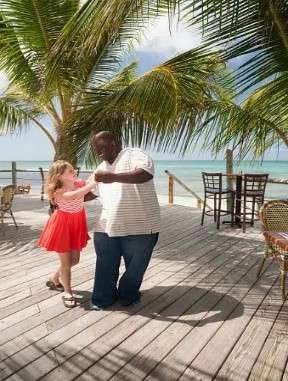PART XII
How to speak British beyond England (continued), course 302
West Indian and the Bahamas dialects:
- Bahamian English
English is the official language of the Bahamas, but the locals speak with a Bahamian dialect that has birthed many unique slang words and phrases. The accent is derived from combinations and plagiarism from Bermudian English, Cockney English, RP, Scottish English, African-American Vernacular English, and Gullah [the original Indian language]. Many people there speak an English-based creole language–Bahamian Creole/Bahamian English/or Baham-ianese. Haitian Creole–a French-based creole language–is spoken by Haitians and their descen-dants, who make up of about 25% of the total population. RP [true British English] is used for government, mass media, education, and business transactions.
For example: switcha=lemonade (made with key limes, not lemons, and mixed with sugar and water). At happy hour, rum is added to make the beverage even more popular; potcake=a particular breed of Caribbean stray dogs with short hair and folded ears. Locals often Locals often feed the dogs scraps of leftovers, like peas ’n rice caked at the bottom of pots—thus, the nickname “potcake”; jam up=a place that is jam-packed, crowded, or full; well mudda sick=excitement or surprise, or “you’re kidding,” “wow,” or “oh my gosh”; tote news=gossip; sip sip is spoken when sipping an island beverage to describe the “word on the street” or the gossip around town. For example, one may catch a little sip sip as it is passed down the grapevine at the fish market or over a game of dominos; Conchy Joe=any white native or longtime resident of The Bahamas. It is used to refer to a popular Bahamian cocktail.
Bey=any person, male or female; leg short=a person or a thing arrives too late; “What da wybe is?”–a popular Bahamian greeting, that means “What’s up?”; wybin’=having a disagreement or argument; a ‘wybe’=a problem or bad situation; “Een nothin”—nothing much. One responds, “what da wybe is?’, which means ‘nothing much’. Try and keep up, students.
Dem is used across many Caribbean islands indicating a plural of any kind, especially a group of people. To make things easier to remember, note these sentences: “Table dem” will mean ‘more than one table’, and also, “I am going with David dem” would translate to “I am going with David and others”. I hope that helps. “Low fence”=someone who is a pushover or easy to take advantage of; Spilligate=general usage for going out on the town, or travel to any of the other islands. It comes from the name of one of the most popular carnival bands in The Bahamas; mash up=to damage, break or destroy. We all appreciate the sentiment now and then, I will mash up this phone/computer/car.”
Jitney=in American retro slang, a car. But in the Bahamas, it is a bus, the best way and also the most interesting way to get from one part of the island to another. In the Philippines, its equivalent is the jeepney.
Note: The Bahamian Alphabet is the same as the United States Alphabet; although there is variation between black and white speakers, there is a tendency for speakers to drop “h” or, in a hypercorrection, to add it to words without it; so, harm and arm are pronounced the same. Other characteristics of Bahamian Creole in comparison to English include: merger of the vowels of fair, fare, and fear into “fea or fia”; free variation of the “happy” vowel between [ɪ] and [i]; the vowel of “first” merges with that of “fuss” by some speakers and with the vowel of “foist” in others. Creole is non-rhotic; so, “r” is not pronounced unless it is before a vowel. Final clusters are often simplified, especially when they share voicing [gold > gol], but not milk >mil.


